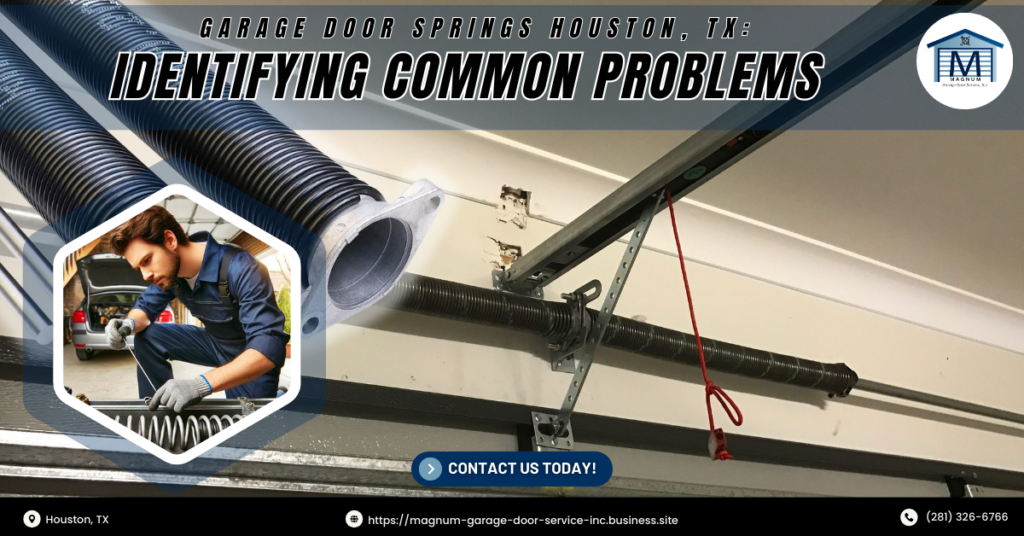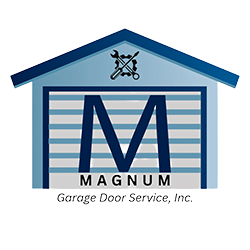
Discover common garage door spring issues in Houston, TX, with Magnum Garage Door Service, Inc. Learn how to identify and address these problems. Expert tips for residential and commercial repairs.
Why Your Garage Door Spring Matters More Than You Think
Have you ever been in a rush to leave for work, only to find that your garage door won’t budge? It’s one of those moments that makes you realize how much you rely on your garage door. But did you know that one of the most common culprits behind a malfunctioning garage door is a faulty spring? At Magnum Garage Door Service, Inc. in Houston, TX, we see it all the time. Whether you’re heading to a game at Minute Maid Park or rushing to an appointment in the Medical Center, a broken garage door can throw a wrench in your plans. Let’s dive into the common issues with garage door springs and how to keep your door running smoothly.
What Exactly Are Garage Door Springs?
Garage door springs are vital components that help lift and lower your garage door with ease. They bear the door’s weight and make it easy for the opener to do its job. There are two main types of garage door springs: torsion springs and extension springs.
- Torsion Springs: Located above the closed garage door, these springs twist and coil to provide the lifting force. Torsion springs are mounted horizontally on a steel shaft and are responsible for the smooth operation of the door. They are generally more durable and provide a smoother operation compared to extension springs.
- Extension Springs: Found on either side of the door, these springs stretch and contract to counterbalance the door’s weight. They are attached to the door track and the door itself, providing the necessary force to lift the door. While they are typically less expensive than torsion springs, they can be more prone to wear and tear due to the stretching and contracting motion.
Understanding the difference between these springs can help you better identify issues and communicate effectively with your repair technician. Both types are essential for the proper functioning of your garage door, and knowing which type you have can make a big difference in maintenance and repair.
Common Garage Door Spring Problems
- Broken Springs: The most obvious issue is a spring that has snapped. You’ll hear a loud bang, and your door will refuse to open. This can be particularly alarming, especially if it happens at an inconvenient time, like late at night or when you’re about to leave for an important event.
- Worn-Out Springs: Over time, springs lose their tension and become less effective, making the door heavy and difficult to lift. You might notice that the door doesn’t stay open as easily or that the opener struggles more than usual. This is a sign that the springs are wearing out and may need to be replaced soon.
- Rust and Corrosion: Springs exposed to moisture can rust, leading to brittleness and eventual breakage. Houston’s humid climate can exacerbate this issue, causing springs to deteriorate faster than in drier environments. Regular inspections and maintenance can help prevent rust from forming.
- Improper Maintenance: Lack of regular lubrication or inspection can cause springs to deteriorate faster. Without proper care, springs can wear unevenly or even break unexpectedly. It’s essential to keep up with maintenance to ensure the longevity and performance of your garage door springs.
Recognizing these common problems can save you time and money by addressing issues early before they become major repairs. Regular maintenance and professional inspections are key to keeping your garage door in top shape.
How to Identify a Spring Problem
- Door Doesn’t Open or Close Smoothly: If your garage door jerks or stops mid-way, the springs might be unevenly worn. This can indicate that the springs are no longer providing the necessary tension, causing the door to operate erratically.
- Loud Noises: Hear creaking or banging? It’s a sign that your springs might be nearing the end of their lifespan. These noises can be an early warning that the springs are weakening and may soon break if not addressed.
- Door Feels Heavy: If the door is hard to lift manually, the springs are likely losing tension. This can also put extra strain on your garage door opener, potentially leading to additional repairs if not addressed promptly.
- Visible Wear and Tear: Regularly inspect your springs for signs of wear, such as rust, gaps, or stretched coils. Visible damage can indicate that the springs are close to failing and should be replaced soon.
Identifying these signs early can prevent more significant issues down the road. Regularly checking your garage door springs and knowing what to look for can help you avoid unexpected breakdowns and costly repairs.
A Story from the Field
A client in the Heights, one of Houston’s historic neighborhoods, called us in a panic one morning. Their garage door wouldn’t open, and they needed to get to work. When we arrived, we found a broken torsion spring. We replaced it quickly, and they were able to go about their day with minimal disruption.
In another instance, a business owner in the Galleria area experienced a similar issue right before the start of the workday. They had an important shipment arriving and needed the door to be operational. Our team responded swiftly, replacing the damaged extension spring and ensuring their business could continue without further delays. These stories highlight how common garage door spring issues are and the importance of timely repairs by professionals.
FAQs About Garage Door Springs
Q: How long do garage door springs last? A: Typically, they last about 7-9 years with regular use, but this can vary based on maintenance and usage frequency. In high-use scenarios, such as in commercial settings or large families, springs might need replacement more frequently.
Q: Can I replace the garage door springs myself? A: It’s not recommended. Garage door springs are under high tension and can cause serious injury if not handled properly. It’s best to call a professional who has the experience and tools necessary for a safe and effective replacement.
Q: What should I do if my garage door spring breaks? A: Stop using the door immediately and contact a professional for emergency garage door repair to prevent further damage or injury. Continuing to use a door with a broken spring can lead to additional damage to the door, opener, and other components.
Q: How often should I have my springs inspected? A: It’s a good idea to have your garage door springs inspected at least once a year. Regular inspections can catch early signs of wear and tear, helping you avoid unexpected breakdowns.
Q: Are there any signs I should look out for to prevent spring failure? A: Yes, look for signs like the door becoming difficult to open, visible wear on the springs, unusual noises during operation, and the door not staying open. These can all indicate that your springs are wearing out and need attention.
Maintenance Tips for Longevity
- Regular Inspections: Check your springs every few months for signs of wear or damage. Look for rust, gaps in the coils, and other signs of deterioration.
- Lubrication: Keep your springs lubricated to prevent rust and ensure smooth operation. Use a high-quality garage door lubricant and apply it to the springs and other moving parts at least twice a year.
- Professional Tune-Ups: Schedule annual maintenance with a professional to catch issues early. A professional technician can identify and address potential problems before they become major repairs.
- Balanced Use: If possible, use all entrances to your home evenly. Relying too much on the garage door can cause the springs to wear out faster.
- Climate Considerations: In Houston’s humid climate, be extra vigilant about rust and corrosion. Regularly clean and inspect your springs to prevent moisture-related damage.
Conclusion: Your Next Steps
Garage door springs are critical to the function of your door. Recognizing and addressing common issues can save you time, money, and hassle. If you suspect your springs need attention, don’t wait for a minor issue to become a major problem.
At Magnum Garage Door Service, Inc., we specialize in garage door replacement in Houston, TX, garage door repair in Houston, TX, and garage door spring replacement in Houston, TX. Whether it’s residential or commercial garage door repair, our team is ready to help. From the bustling streets of Downtown Houston to the serene suburbs, we’ve got you covered.
If you’re experiencing garage door spring problems, don’t hesitate. Contact Magnum Garage Door Service, Inc. today for expert garage door installation, repair, and maintenance.
Have questions or need immediate assistance? Leave a comment below or get in touch with us directly! We’re here to help.
